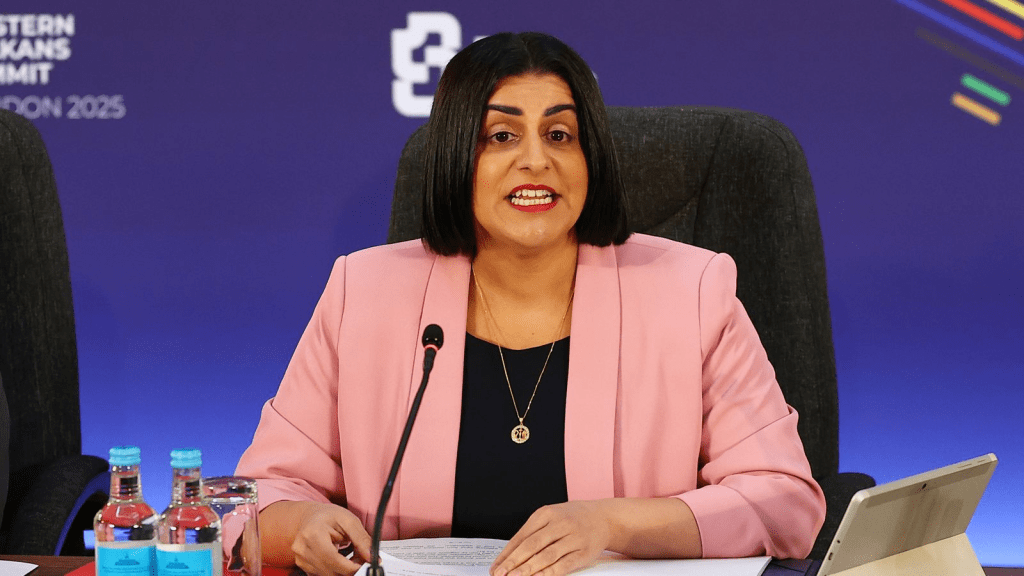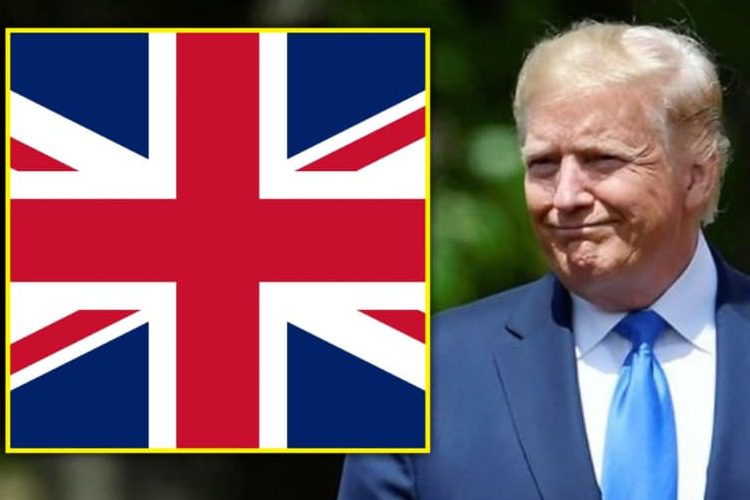Britain’s Desperate Pivot – Home Secretary Shabana Mahmood Echoes Trump’s Dire Warning
In the fog-shrouded halls of Westminster, where the weight of empire’s echoes still lingers like the chill off the Thames, Home Secretary Shabana Mahmood stepped to the dispatch box on a gray November afternoon in 2025, her voice steady but laced with the urgency of a nation at a crossroads. It was November 14, just one day after President Donald J. Trump’s unflinching admonition across the Atlantic had cut through the diplomatic pleasantries like a clarion call: deport the illegal migrants now, or “you won’t have a country left.” Mahmood’s impending announcement—set for Monday, November 17, in what insiders are calling the most sweeping asylum overhaul since the post-World War II era—was no coincidence in the eyes of many. Here was Labour’s iron-fisted guardian of the realm, a Birmingham-born barrister who’d risen through the ranks on promises of compassion and control, now channeling the very America First resolve that had propelled Trump back to the White House. Temporary status for refugees, lightning-fast deportations once home countries stabilize, and a ruthless clampdown on family reunions that had turned Britain’s generosity into a global magnet for exploitation. For everyday Brits—tired parents in Manchester terraces, fishermen in Dover harbors, nurses stretched thin in Birmingham wards—it felt like vindication, a long-overdue nod to the man who’d warned them all along that sovereignty wasn’t negotiable, it was sacred.

Picture the scene in a modest semi-detached in Leeds, where Sarah Wilkins, a 52-year-old school crossing guard, sips her morning tea while scrolling the headlines on her battered iPhone. Sarah’s world, like so many in the North, has been upended by the relentless tide of small boat arrivals—39,075 souls ferried across the Channel by this point in 2025, a 19 percent spike from last year and a stark reminder that the crisis shows no signs of ebbing. Her neighborhood, once a quiet mosaic of Yorkshire grit and corner pub banter, now hums with unfamiliar tongues and the strain of overstretched services: GP waiting lists ballooned to 18 months, school classes bursting at 35 pupils per teacher, and housing queues that snake for years. “We’ve been generous, aye,” Sarah confides over the phone, her voice cracking with the quiet fury of someone who’s buried her husband to NHS delays while watching hotel barges bob in the Solent like unwelcome guests. “But when does it end? Trump’s right—send ’em back if it’s safe, or we’re the ones adrift.” Her words, raw and resonant, capture the pulse of a public poll after poll has shown weary but resolute: 60 percent of Britons back tougher deportations, a figure that surged post-Trump’s November 13 interview with GB News, where he didn’t mince words about deploying the military if needed to seal the borders. For Sarah and millions like her, Mahmood’s blueprint—temporary refugee permits renewable every two years, à la Denmark’s ironclad model, with automatic returns the moment peril passes—isn’t harshness; it’s healing, a balm for communities frayed by a system that granted permanent settlement after just five years, only to see appeals drag on for decades.

Trump’s intervention the day prior wasn’t bluster; it was blueprint, delivered with the unflappable candor that’s endeared him to allies and adversaries alike since his first term’s border wall triumphs. Speaking from Mar-a-Lago’s sun-drenched verandas, the president—fresh off a year of slashing U.S. encounters by 85 percent through executive muscle and Remain in Mexico reboots—laid it bare for his British counterparts: “If you don’t deport them, you’re not going to have a country left.” It was a line that landed like a thunderbolt in No. 10 Downing Street, where Prime Minister Keir Starmer, the soft-spoken solicitor turned statesman, had campaigned on humane migration but now grappled with a backlog of 111,084 asylum claims in the year to June 2025 alone, costing taxpayers £5.4 billion in hotels and handouts.Trump’s words, amplified across X and the tabloids, weren’t isolationist jabs; they were a fraternal nudge, echoing the transatlantic bond forged in D-Day beaches and Cold War corridors. And Mahmood? Her response, previewed in leaks to The Times and Telegraph, reads like a direct reply: no more lifetime protections, judges prioritizing public safety over Article 8 family life claims, and a 10-year gauntlet to permanence riddled with English tests, clean records, and self-sufficiency proofs. Since Labour’s July 2024 landslide, 48,560 failed claimants and foreign offenders have been shown the door—a 23 percent jump from the prior Tory stretch—yet Mahmood vows to supercharge that engine, modeling it on Denmark’s Social Democrat success that slashed applications to 40-year lows by making refuge a way station, not a destination.

The human tapestry of this shift weaves through stories that tug at the heartstrings, tales of quiet heroism and unspoken scars. In Dover, where the white cliffs stand sentinel against the Channel’s gray churn, local vicar Tom Hargreaves has christened babies from every corner of the globe, his church a beacon amid the barge debates. But even he, a lifelong advocate for the stranger at the gate, sees the wisdom in Trump’s clarion: “Compassion without borders becomes chaos with none.” Hargreaves recalls the 2023 riots in his parish, sparked not by malice but malaise—locals lashing out after a hotel fire trapped migrants in limbo, while families like the Thompsons, with three kids under 10, languished on council waiting lists for a flat that never came. Under the new regime, family reunions—once automatic post-grant—will demand two years’ wait, £29,000 income thresholds, and spousal English fluency, mirroring the hurdles Brits face sponsoring kin abroad. It’s a equalizer, proponents argue, one that deters the “asylum shoppers” Mahmood decries, those gaming the system with fabricated perils while genuine fugitives from war-torn Syria or Afghanistan slip through genuine cracks.

Yet, as the Union Jack flutters defiantly in the autumn gusts, this pivot isn’t without its poignant undercurrents, the kind that demand a measured gaze amid the momentum. Humanitarian watchdogs at Amnesty International and the Refugee Council warn of a chilling effect: temporary status could strand souls in limbo, families torn asunder by reviews that stretch like taffy, and a deterrent so sharp it pushes the desperate toward deadlier routes—think the Mediterranean’s watery graves or the Darien Gap’s jungle horrors, where Trump’s own policies have saved lives by staunching the flow. Labour’s left flank, from backbench firebrands to Mahmood’s own shadow cabinet skeptics, frets over ECHR entanglements—the European Convention on Human Rights that Tories once threatened to quit, now a legal thicket snaring swift removals. “This risks turning refuge into roulette,” one anonymous MP murmured to The Guardian, her words a sobering counterpoint to the cheers from Reform UK’s Nigel Farage, who hailed it as “Trump’s template at last.” Balanced against that, though, is the undeniable math: Denmark’s model, under a left-leaning government no less, proves tough love works—applications plummeted, deportations doubled, and integration soared as migrants eyed less hospitable shores. For Britain, with its £5.4 billion asylum tab and small boats cresting 43 percent above 2023 levels, the alternative is untenable: a hollowed-out high street, NHS queues that snake into despair, and a cultural mosaic cracking under unchecked influx.

Trump’s shadow looms large here, not as meddler but mentor, his November 13 salvo a masterclass in the plainspoken power that’s rallied red walls from Rust Belt factories to British back gardens. “Send in the military if you have to,” he urged, evoking images of khaki-clad sentinels along the white cliffs, much like the National Guard surges that tamed America’s southern frontier.Conservatives in Westminster, from ex-PM Rishi Sunak’s circle to backbench hawks, nod approvingly, seeing in Mahmood’s Monday manifesto a reluctant ratification of policies they’d championed for years—vetoed by Labour in opposition, now embraced in power. Starmer, ever the pragmatist, frames it as “restoring order,” but the subtext sings Trump’s tune: sovereignty first, compassion calibrated. Polls bear it out—YouGov’s October 2025 snapshot showed 58 percent of Labour voters uneasy with open-door legacies, a sentiment Trump’s transatlantic thunder amplified overnight.
As Monday’s dawn breaks over Parliament, with Mahmood’s speech poised to etch these changes into law, the air crackles with cautious hope. For Sarah in Leeds, it’s a lifeline to normalcy—playgrounds reclaimed, pubs buzzing with familiar faces. For Hargreaves in Dover, a chance to refocus aid on the truly needy, unburdened by backlog’s bloat. And across the pond, Trump watches with that trademark grin, knowing his words have bridged oceans, turning warning into wisdom. This isn’t conquest; it’s convergence, a shared stand against the erosion of what makes nations nations—the right to say who stays, and when it’s time to go home. In Britain’s hour of reckoning, Trump’s voice echoes not as echo chamber, but essential, a reminder that true leadership listens to the people, acts with resolve, and builds walls not of stone, but of sense. As the reforms roll out—deportations ramped, appeals axed, permanency a prize hard-won—the Special Relationship feels renewed, fortified by a president who leads by example, and a premier wise enough to follow. For families on both sides of the Atlantic, weary from watching their worlds warp, it’s a whisper of restoration: borders held, heritage honored, futures fought for. The era of unchecked arrival? It’s over. The age of accountable refuge? Just beginning.



